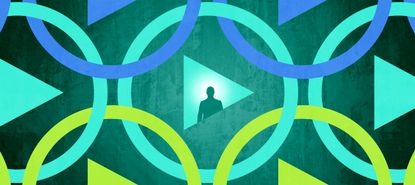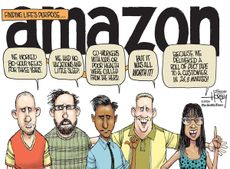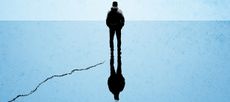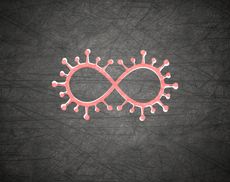Too anxious to press play
We have more entertainment options than ever before. That's stressing a lot of people out.


At first, I thought my brain was broken.
Every time I had a spare evening, I would sit down in front of my TV, open Netflix, and be presented with an array of brilliant film and TV. After 20 or 30 minutes of hemming and hawing, I'd watch something I'd already seen before.
Up until recently, I assumed I had so damaged my attention span with social media, games, and screens in general, that I had lost the capacity to engage with anything remotely smart or interesting. And maybe that's true. But last week, I tweeted about my affliction, asking if anyone else had ever felt this strange aversion to starting a new movie or show — and the response was overwhelming. Even with my modest follower count, more than 100 people chimed in with similar experiences. It was fascinating. And just as interesting were the variety of reasons people cited for their aversion to pressing play: stress, anxiety, the content of most modern entertainment, a fear of missing out, or a fear of wasting time — it was a long list.
Subscribe to The Week
Escape your echo chamber. Get the facts behind the news, plus analysis from multiple perspectives.

Sign up for The Week's Free Newsletters
From our morning news briefing to a weekly Good News Newsletter, get the best of The Week delivered directly to your inbox.
From our morning news briefing to a weekly Good News Newsletter, get the best of The Week delivered directly to your inbox.
Here we are at a moment in history where we are spoiled for choice when it comes to entertainment, and this is stressing some people out. What's going on?
My Netflix dilemma is hard to explain. The feeling I get when confronted with a decision about what to watch is almost like revulsion, as if I've been assigned a task I hate and am loath to start it. I should just pick what I want to watch and be happy with my choice. But we've become familiar with how the digital world has changed things. Now, we have the paradox of the "tyranny of choice," a concept from psychologist Barry Schwarz, which suggests abundant choice makes people miserable because it paralyzes them with too many options.
That makes an intuitive kind of sense. Not only do we now have Netflix, but also Disney+, Amazon Prime, Apple TV+, regular cable TV, traditional movies, not to mention the entirety of the internet, including the seemingly limitless content on YouTube.
With such an array of content, our day-to-day choices have become loaded. Instead of there being one thing everyone you know is talking about, the fragmentation of shared culture means that in order to participate in some fashion, you have to pick one stream or another. Even now, cultural discourse is lit up with talk of Succession, Watchmen, The Mandalorian, Marriage Story, The Irishman, not to mention the films nominated now that we've reached award season. You can't watch all of them — who has the time? — so maybe it's just easier to give up.
Many people who responded to my tweet said that delving into challenging material was particularly difficult, especially given the problems on display and ever present in our various social media feeds. When it feels like fascism is on the rise or that climate change will kill us all, who wants to slog through an awkward or difficult film, when you could instead just watch reruns of The Great British Baking Show?
The tension between entertainment that is comforting and that which is challenging is centuries old. In Western literature, everyone from Sir Philip Sydney to Alexander Pope to Immanuel Kant made the argument that good work required effort to understand — that it needed critics to tease out its meaning.
That dynamic turned into its own sort of culture war: Are you going to engage with something hard and artistic, or are you going to wallow in mainstream pablum? That kind of elitism has, for a variety of reasons, fallen out of favor. But perhaps it's not just that postmodernism has reconfigured how we create hierarchies of art, but more simply that when there is too much stuff, things that are easy suddenly feel more valuable.
We tend to think art is a mirror held up to society. But in times of great change or distress, it's important to remember German playwright Bertold Brecht's rejection of that notion. He said "art is not a mirror held up to reality but a hammer with which to shape it." You would think that in these difficult times, we would want art to challenge the status quo, that we would gravitate toward film and TV that speaks to how we might react to dark forces rising. But is it possible that the rise of digital technology is changing the social function of entertainment, more sharply cleaving a line between the sort that is meant for pleasure and the kind that is meant to edify, or connect you with, the human?
That is perhaps too large a question for now. But it seems there is something about modern life that is changing how we relate to the things we previously used as distraction tools. With the infiltration of work into daily life, to-do lists pinging on our phones, and a set of digital tools designed to keep us hooked and never at rest, is it any wonder that YouTube is preferable to a hard film about a failing marriage? Maybe my brain is broken. But maybe, as 2019 draws to a close, it isn't the only thing that is.
Want more essential commentary and analysis like this delivered straight to your inbox? Sign up for The Week's "Today's best articles" newsletter here.
Create an account with the same email registered to your subscription to unlock access.
Sign up for Today's Best Articles in your inbox
A free daily email with the biggest news stories of the day – and the best features from TheWeek.com
Navneet Alang is a technology and culture writer based out of Toronto. His work has appeared in The Atlantic, New Republic, Globe and Mail, and Hazlitt.
-
 'Republicans want to silence Israel's opponents'
'Republicans want to silence Israel's opponents'Instant Opinion Opinion, comment and editorials of the day
By Harold Maass, The Week US Published
-
 Poland, Germany nab alleged anti-Ukraine spies
Poland, Germany nab alleged anti-Ukraine spiesSpeed Read A man was arrested over a supposed Russian plot to kill Ukrainian President Zelenskyy
By Peter Weber, The Week US Published
-
 Today's political cartoons - April 19, 2024
Today's political cartoons - April 19, 2024Cartoons Friday's cartoons - priority delivery, USPS on fire, and more
By The Week US Published
-
 Do unvaccinated COVID patients deserve scarce care? A doctor weighs in.
Do unvaccinated COVID patients deserve scarce care? A doctor weighs in.The Explainer Justice, judgment, and the last ICU bed
By Bonnie Kristian Published
-
 How to vaccinate the anti-vaxxers
How to vaccinate the anti-vaxxersThe Explainer Instead of blaming people for not doing the right thing, let's focus on eliminating the obstacles to vaccination that still remain
By Noah Millman Published
-
 The U.S. could double its COVID-19 vaccine availability overnight. What's the holdup?
The U.S. could double its COVID-19 vaccine availability overnight. What's the holdup?The Explainer How the FDA could approve a more efficient vaccine rollout
By Bonnie Kristian Published
-
 COVID-19 keeps proving everyone wrong
COVID-19 keeps proving everyone wrongThe Explainer Our coronavirus culture war is no match for the virus
By Noah Millman Published
-
 The October Surprise nobody wanted
The October Surprise nobody wantedThe Explainer Trump has COVID-19. Really, 2020?
By Peter Weber Published
-
 Life is worth living
Life is worth livingThe Explainer What's driving America's rising suicide rate?
By Matthew Walther Published
-
 Social workers are masters at de-escalation. Here's what the police can learn from them.
Social workers are masters at de-escalation. Here's what the police can learn from them.The Explainer Knowing how to peacefully resolve conflict, rather than exacerbate it, can save lives
By Tonya Russell Published
-
 Settling in for the long pandemic
Settling in for the long pandemicThe Explainer Life won't be back to "normal" anytime soon
By Jeva Lange Published